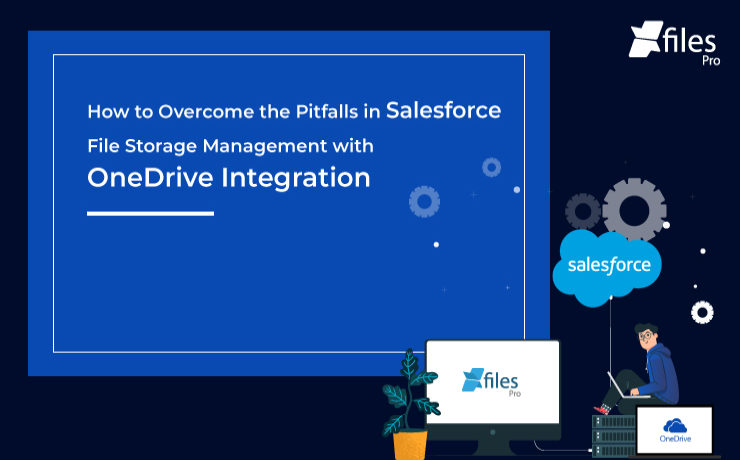In today’s technology-driven world, Salesforce has become the go-to choice among businesses in respect to CRM platforms. By providing excellent support for the sales and marketing needs of businesses, it enables them to manage customer accounts, opportunities, activities, and much more in an even efficient manner. But a massive volume of diverse content is produced during these processes which is then stored in the Salesforce file storage.
Now this content requires regular organizing and management but inherently Salesforce lacks those effective document management and storage efficiency capabilities. The fact that this sensible CRM system is not designed to perform document management functions also contributes to its limitations. Also in the list of drawbacks is the limited amount of native Salesforce file storage. To overcome these limitations, most companies choose to integrate Salesforce with external content management systems.
OneDrive, a file hosting service powered by Microsoft, is one such popular solution that enterprises routinely choose for managing and securing their Salesforce files. This article aims to highlight some of the benefits of seamless collaboration between Salesforce and OneDrive & how it extends the CRM’s collaboration and document management capabilities.
OneDrive: What Exactly Is It?
OneDrive is Microsoft’s file hosting and synchronization service that allows users to securely store their important files in a single place and then access them from virtually anywhere. This easy-to-use cloud storage solution lets users store files and personal data in the cloud, share them with other users, & sync these files across various platforms. Owing to its cross-platform design, OneDrive also makes it easy to collaborate with others in real-time using the Microsoft 365 integration.
When it comes to professional purpose, OneDrive for Business is available to offer cloud storage to businesses. Managed by the organization itself, it enables users to share and collaborate on documents with other co-workers. Powered by SharePoint, ODFB grants each individual user a personal storage space while facilitating the collaboration among team members.
Why Should You Consider Using OneDrive
The cloud storage application has several notable advantages for the user experience:
- Remote access from any device– OneDrive offers the convenience of flexibility and mobility which comes in handy when employees work remotely or data is stored across multiple locations. This means that all files saved in the OneDrive storage immediately become available across all the devices synchronized with the OneDrive platform.
- Automatic file back-up– When using OneDrive, the files are periodically and automatically uploaded to the cloud storage which ultimately creates a reliable back-up that can be restored any time.
- Document sharing & collaboration– Users can easily share files or folders with their team, depending on the permission granted. Files can be shared either through direct link-sharing or link-sharing with some sign-in verification.
- Collaborative document editing– All the shared documents can be instantly edited in real-time through the co-authoring feature which promotes streamlined collaboration among team members.
- Top-notch security features– The default security features in OneDrive include not only encrypting data in transit but also providing encryption-at-rest. It also allows users to encrypt specific files when needed, further enhancing security. Teams can also be designed to provide specific access permissions to different users, offering yet another layer of security.
- Storage space– Essentially OneDrive gives business users up to 1 TB of storage space per user, which is far more than what most users would ever use. OneDrive also provides options to control what files are synced to the personal folder while allowing administrators to easily determine how much storage space each employee is using.
Also read: Salesforce & OneDrive Integration – How to transform your Salesforce file management needs
The Salesforce-OneDrive integration ultimately paves the way for highly intuitive and centralized document management in the Salesforce ecosystem. Such kind of integration ensures scalability and future-proofing for the Salesforce file storage and the file repository costs. By collaborating with OneDrive inside the Salesforce system, users will also be able to extend the integration functionalities to other Salesforce products such as Salesforce Sales Cloud, Service Cloud, & Experience Cloud.
How Is Salesforce-OneDrive Integration Advantageous
Listed are some of the ways businesses stand to enjoy from an integration between Salesforce and OneDrive systems:
- Cost Savings– When using Salesforce, the licensing cost per user is more expensive than purchasing OneDrive for all employees due to which even a full-fledged collaboration between SharePoint and OneDrive is cheaper than purchasing new licenses in Salesforce.
- Improved Flexibility for the Sales Teams– The Salesforce-OneDrive collaboration helps in saving time and effort by enabling quick and easy access to the required resources. The synchronization between the systems enables real-time interactions and instant notifications regarding any updates.
- Storage for Large Documents– Though OneDrive allows offline file access by syncing with SharePoint, the extensive file support in Salesforce gets restricted to 2GB. After carrying out the Salesforce-OneDrive integration, businesses can bypass the restrictions of space constraints and ensure seamless operations every time.
- Better Document Management– OneDrive provides automatic file versioning for documents stored in Salesforce and lets users decide what version has to be finalized and what all will be discarded, thereby allowing teams to have better control on their documentations. Along with version control, OneDrive integration also offers online & mobile editing, native sharing capabilities, and custom workflows across both systems, which further simplify the document management process.
- Strengthened Security– OneDrive enforces adequate permissions and authorization rights in order to access the documents stored in its storage, which can be directly governed by the administrator. Therefore, there is no need for greater admin security after integrating Salesforce with OneDrive system.
- Better Collaboration among Teams– Along with Salesforce-OneDrive integration comes improved file collaboration. This integration allows the users to easily share and maintain multiple documents among various departments as well as editing them in real-time, thus enabling direct and swift collaboration.
Let XfilesPro be your guide for Salesforce-OneDrive Integration
If struggling with Salesforce Files Connect is not your cup of tea and you also don’t want the hassle of designing your own custom-built integration application, then opting for ready-made third-party applications, like XfilesPro, is something you should definitely consider. XfilesPro is a popular AppExchange solution that is designed to help Salesforce users seamlessly store and collaborate Salesforce files in OneDrive storage.
This highly customizable and admin-friendly application possesses exceptional file management capabilities using which the users can significantly reduce their Salesforce file storage costs. XfilesPro allows Salesforce users to easily set-up the collaboration between the Salesforce CRM platform and OneDrive system in a few simple steps without much complexity. Another thing that aids the integration is the 360-degree Salesforce file collaboration feature, which simplifies the overall process.
Also read: How to Store Salesforce Files in External Storages using XfilesPro: Steps to Follow
XfilesPro also offers other lucrative and utilitarian features such as centralized content management, file and folder hierarchy management, bulk file handling capability, multi-org file integration, auto-export (file archiving) functionality, and large volume file migration. Not only this, XfilesPro can also be used to collaborate the Salesforce system with various other external file storage systems like SharePoint, Amazon S3, Google Drive, Dropbox, SMB, SFTP, and Network Drive.
To know more about XfilesPro and how it can facilitate seamless Salesforce-OneDrive integration, get in touch with us or schedule a quick demo here.




